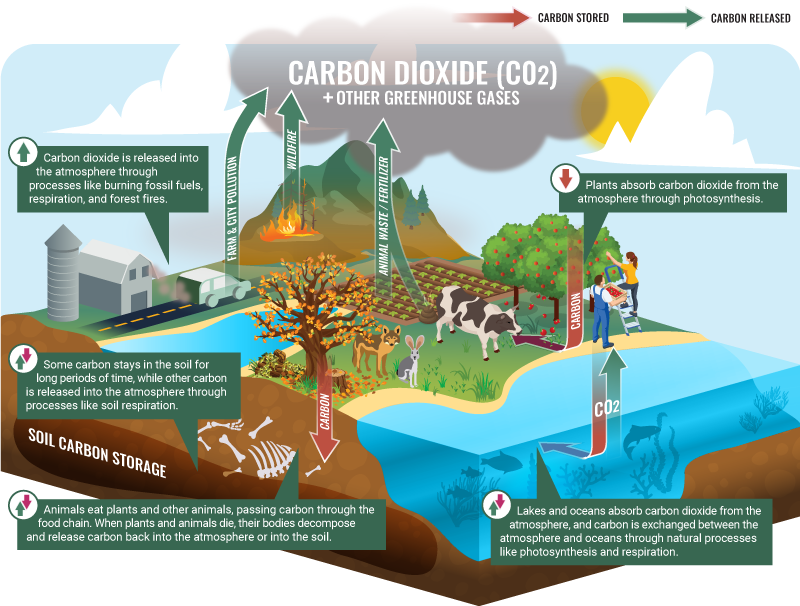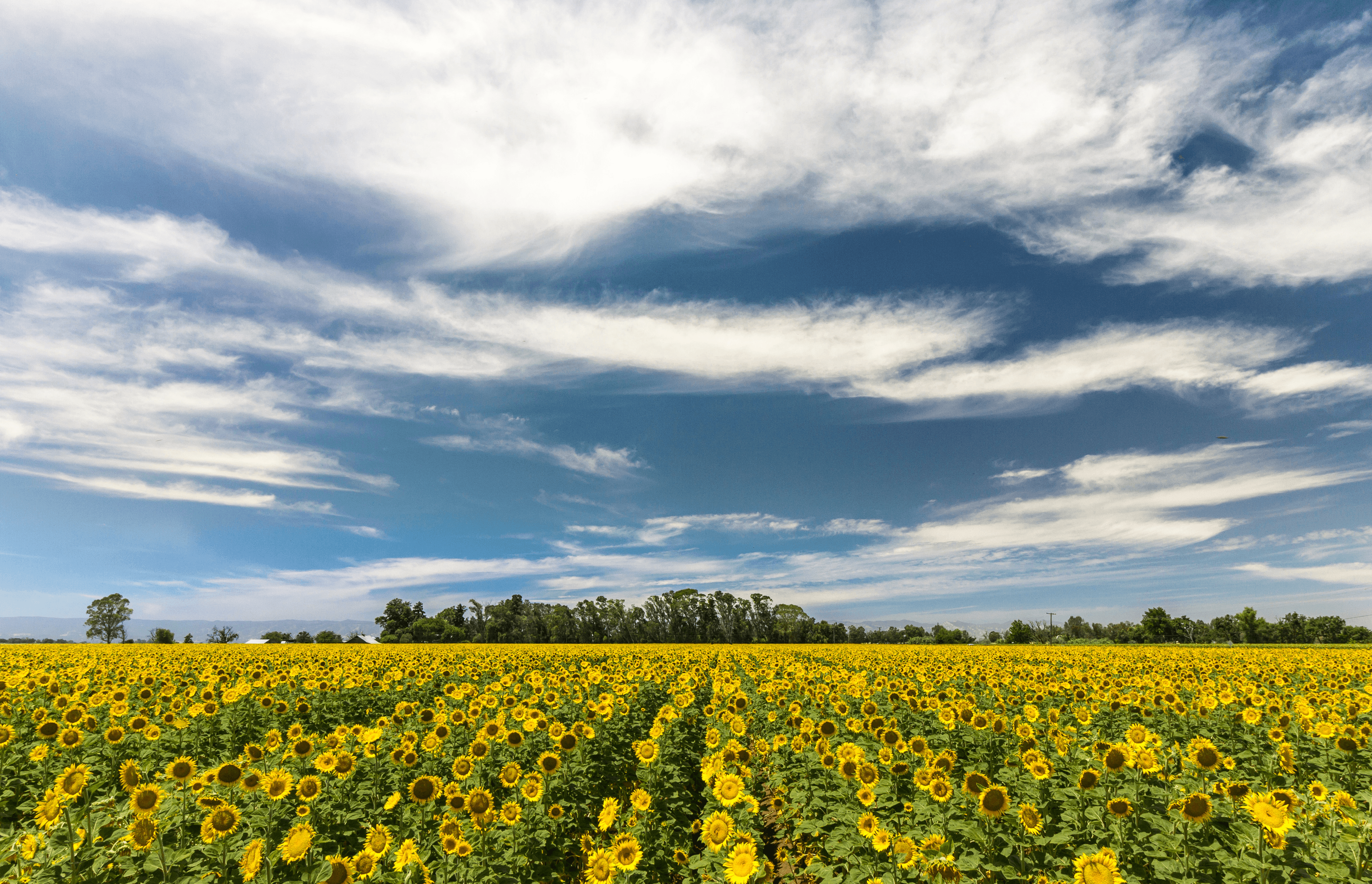
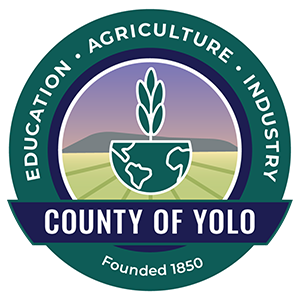
Climate Action and Adaptation Plan
Building a resilient, equitable, and carbon-negative future for Yolo County

View the Final Adopted Climate Action and Adaptation Plan!
The Yolo County Climate Action and Adaptation Plan (CAAP) was unanimously adopted by the Board of Supervisors on December 3, 2024!
Thank you to all who contributed to the development process through attending YCCAC Meetings, E&E TAC Meetings, and NWL TAC Meetings, participating at CAAP Workshops, sharing our message, inviting us to outreach events, filling out surveys, and providing public comment. The Sustainability Division is grateful and appreciative of all of the support received throughout this journey.
Here's the plan!
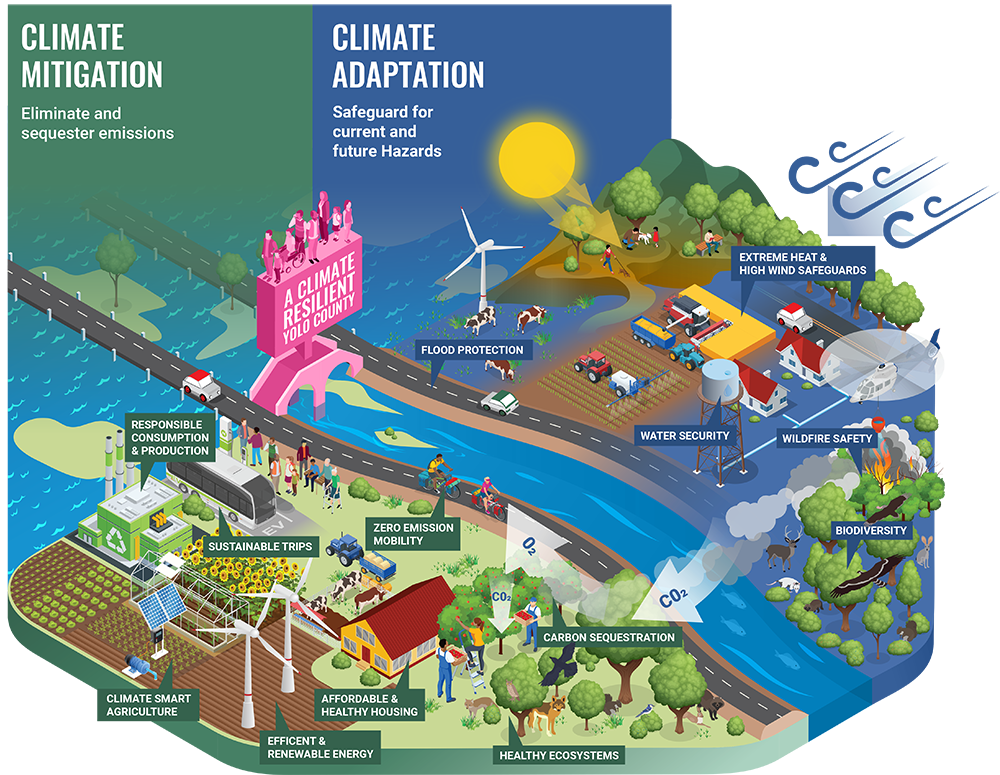
Frequently Asked Questions
What is a Climate Action and Adaptation Plan (CAAP)?
A Climate Action and Adaptation Plan (CAAP) is a roadmap that outlines the actions that Yolo County will take to meet greenhouse gas (GHG) emissions reduction goals and help our community be more resilient to climate impacts such as higher temperatures, more frequent wildfires and floods, and drought.
Why is Yolo County developing a CAAP?
In September 2020, the Yolo County Board of Supervisors approved a Climate Emergency Declaration that set the goal of meeting a carbon-negative footprint by 2030 while ensuring a just transition to an inclusive, equitable, sustainable, and resilient local economy. Driven by public input, the CAAP includes recommendations for how we can lower emissions, protect our natural resources, use more renewable energy, support sustainable agricultural practices that are already thriving here in Yolo County, and more. The CAAP is designed to benefit all community members and to promote health, equity, and resilience in all processes and outcomes.
What is a Just Transition?
A Just Transition is a vision-led, unifying, and place-based set of principles, processes, and practices that empower and build social and economic opportunity and wellbeing among historically disadvantaged populations. This transition balances the urgency of necessary changes with the commitment to sustainable and just realignments. This transition incorporates the perspectives of all individuals and groups, particularly marginalized groups, to ensure that climate solutions meet the needs of the community at large. A Just Transition strikes a balance between the speed of necessary changes while still promoting necessary, sustainable, and just realignments.
The term “Just Transition” was coined by union laborers and environmental justice advocates who recognized that reductions in GHG emissions (i.e., deindustrialization processes) often exacerbated the socioeconomic inequities experienced by low-income communities and communities of color because these communities were frequently employed by high-carbon-emitting industries. The County used the term “Just Transition” in its 2020 Climate Emergency Declaration to describe the rapid mobilization of resources directed at climate change action and adaptation.
Can you define climate adaptation and resiliency?
Climate adaptation refers to the actions taken to prepare for and respond to the impacts of climate change. It involves adjusting and planning for the potential changes in temperature, precipitation, sea level, extreme weather events, and other climate variables to reduce vulnerabilities and increase resilience.
Resiliency, in the context of climate change, is the ability of individuals, communities, systems, institutions, and businesses to withstand, recover, and thrive in the face of climate change and chronic stress. It involves building systems and structures that can absorb and adapt to the changes brought about by climate change, while also preparing for future impacts.
What is a carbon-negative footprint?
This means that Yolo County will remove more carbon from the atmosphere than we produce. We will do this by reducing our emissions, while also supporting practices that increase the amount of carbon stored in our soils (also known as carbon sequestration).
Does the CAAP include the cities in Yolo County?
The CAAP specifically covers the unincorporated area of Yolo County (the area outside of our four cities), and our outreach is focused on the unincorporated area and communities that have historically been excluded from planning processes. However, Yolo County coordinated closely with the Cities of Davis, West Sacramento, Winters, and Woodland; the Yocha Dehe Wintun Nation; UC Davis; and other partners to align goals and projects in our planning process.
How can I stay involved?
Sign up for the Yolo Sustainability Newsletter by visiting this link (sign-up is at the bottom of the page). The County will be providing updates throughout the CAAP implementation process, and will share important information, opportunities to participate, helpful resources, progress updates, and more. You can also follow us on Instagram and Facebook!
We would also like to see you at one of our monthly Climate Action Commission Meetings (the 4th Monday of the Month from 4-6:30PM). For agendas and Zoom link, visit this link.
Climate Action and Adaptation Plan Timeline
Spring, 2024
Third Round of CAAP Tabling Events Begins

Oct
Nov
Dec
What does climate action, resilience, or sustainability in Yolo County mean to you? Share your story and/or photos for a chance to be featured on our social media pages!
Final CAAP Downloads
Yolo County Final Adopted Climate Action and Adaptation Plan
Appendix A: Community Engagement and Equity Strategy
Appendix B: Climate Action
Appendix C: Natural and Working Lands
Appendix D: Climate Adaptation
Appendix E: Strategies, Measures, and Actions Supporting Information
Appendix F: Funding and Financing
Appendix G: Implementation and Monitoring
Appendix H: Summary of Public Comments and Changes
Yolo County Climate Emergency Resolution
In September 2020, the Yolo County Board of Supervisors passed and adopted Resolution No. 20-114, which declared climate change a crisis requiring action. The resolution called for a just transition towards an inclusive, equitable, sustainable, and resilient local economy, and a call to support and advocate regional, national, and international efforts necessary to reverse the climate, social justice, and economic crises.
The resolution directed the creation of the Yolo County Climate Action Commission, which was charged with advising on the development and implementation of a new Countywide Climate Action and Adaptation Plan to become carbon negative by 2030.
Workshop Overviews
In line with the Board's direction that the CAAP center equity, the Sustainability Division worked with the Commission, the Equity and Engagement Technical Advisory Committee (E&E TAC), the Natural and Working Lands Technical Advisory Committee (NWL TAC), and the Community Outreach Partners to develop a comprehensive public engagement effort that spanned the County's five districts. Throughout the CAAP development process, the Sustainability Division, Commission, and partners have conducted:
37 Community Tabling Events (i.e. pop-up events, tabling at festivals, in partnership with the County library branches, etc.)
24 Presentations at community Meetings (i.e. school boards, Citizens Advisory Committees, Chambers of Commerce, etc.)
21 Community Workshops across three workshop series, including bi-lingual and Spanish-only workshop options.
82 Public Engagement Events Total
Furthermore, more than 1,000 community members completed surveys throughout the CAAP development process, providing input on the climate impacts their communities are experiencing, priorities for future program development, and interest in adopting practices that reduce our collective carbon footprint. Thank you to all of the Yolo County community members and community-based organizations that took the time to shape the development of the CAAP.
This outreach would not have been possible without the support of our Community Outreach Partners:
Center for Land-Based Learning
Cool Davis Foundation
De Colores Resource Center
Davis Odd Fellows
Yolo Food Bank
Contact Us
Do you have questions about the CAAP? Feel free to reach out to us via email at sustainability@yolocounty.org, or send us your thoughts through the contact form below!

